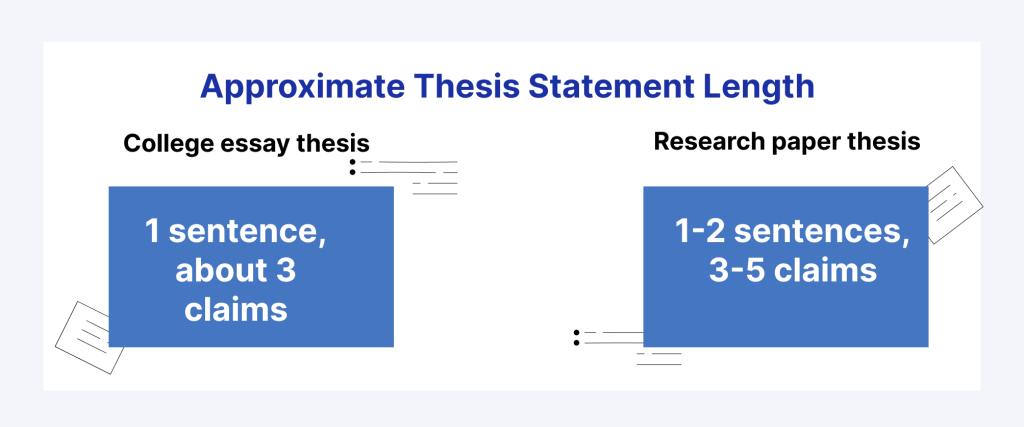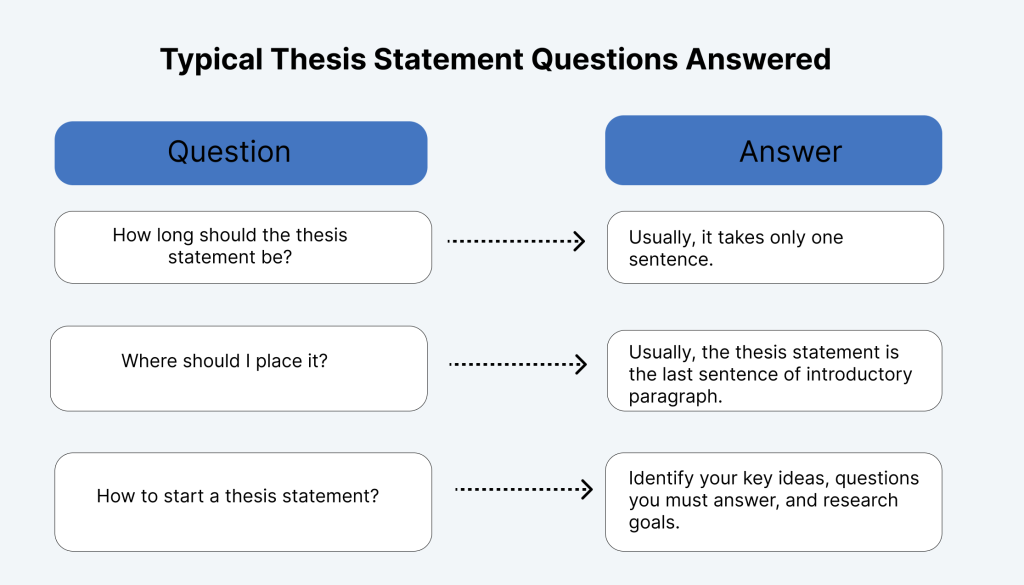Crafting a clear thesis is crucial in any academic or research work. A concise thesis statement should help you to stay focused on your argument. It also enables the reader to understand the purpose and significance of your study. The core academy thesis has to be specific, concise, and arguable. It should clearly state your main idea or argument and impact the structure of your paper. Additionally, specific thesis statements help you to engage with existing research and initiate the scholarly conversation. How long is a thesis statement in a standard form? Let’s review this and other aspects.
Thesis Statement Basics Before We Go to “How Long Should a Thesis Statement Be” Question
While there are numerous rules to consider, some of them serve greater importance. The author of the paper needs to know what the principle characteristics of a thesis statement are. Thankfully, there are AI tools that can help to construct a thesis.
What is a thesis statement?
A thesis statement is a part of the paper which resumes its argument. Additionally, a specific thesis statement excludes inappropriate details or explanations. Thanks to a concise thesis statement, the audience realizes the paper’s content. Crafting a clear thesis statement can demonstrate all of the main points of your argument. Whether you create it personally or by using Avidnote, the impact is the same. Even if the paper has a length of several pages, the thesis statement should represent them. How long should a thesis statment be is an easy question, too. That’s why core thesis statements can be either short or long.
Writing a thesis statement can be tough but key to success. If you’re having trouble articulating your main point, a thesis writing service can be a lifesaver. These services will give you expert guidance so your thesis statement is not only short and focused but also matches the structure and purpose of your paper. Work with professionals and refine your ideas, keep your argument strong and navigate the academic requirements with ease.
Working with a thesis writing service means your work shows both the depth of your research and the clarity of your argument and will make an impression on professors and readers.
The thesis statement is the backbone of your paper. You must build your arguments, structure, narration, and examples coming from the basis of your thesis statement.
Why is it important to have a thesis statement?
A lot of students struggle to create a focused thesis statement. A statement is a crucial part of the dissertation. That’s why they worry about writing #mythesis at all! How long should a thesis statement be depends on your goals. Nevertheless, a clear thesis statement is priceless as the main tool for the author.
- Academy thesis statements reflect your main evidence in a sentence. Crafting its argument navigates you throughout the paper! Even the thesis statement length can help you.
- A concise and logical thesis statement helps you to avoid unnecessary information in the text. It’s the leading sentence and a component of any academic paper.
- An intriguing core thesis statement attracts the main audience with its argument. Students receive grants and professors’ support thanks to original thesis statements. A thesis statement should defend their research potential.
What tool can help me write a strong thesis statement?
Modern technologies help to write a specific paper quickly despite its length. To develop a useful thesis, you have to understand some clear options. The first one to use is the Thesis Statement Generator. It works well for students where other tools don’t. Avidnote is a trustworthy tool for composing a dissertation paper with advanced words as well. It will make you free of overthinking while grounding the main idea. All thanks to the way you can store clear important notes there.
However, if you need more freedom and creativity, try other dissertation tools. For example, you can use Chat GPT writing assistance. The program will understand the text and write the most specific thesis for your topic.
What makes a strong thesis statement?
Thesis statements can be strong or weak. That’s why professors demand students to be accurate when choosing a thesis for their paper. There are secrets about how to avoid problematic thesis statements.
Crafting the thesis statement has to be straight to the point. It has to reveal the major idea and the arguments. Don’t explain these arguments in crafting the thesis statement. The thesis statement should fit the dissertation requirements. You’ll have enough space in body paragraphs to do it additionally. On the other hand, a concise thesis statement can contain opposing evidence. This is to prove that your opinion is more valuable. The vision of how long should a thesis be defines its worth. This category belongs to papers with a sufficient rebuttal. The latter is responsible for ensuring the audience that the contrary idea is doubtful. You have to make it where needed and keep the reader focused.
Make a thesis using the method “idea from paragraph A plus idea from paragraph B.” This approach will keep your thesis closely aligned with the rest of your paper.
What are the top three ways to start a thesis statement?
The thesis statement is a general response to your question. Make sure you understand the latter. Any essay has a central question that it explores. Even if it’s your analytical point of view, you’re still delivering it with words. And the reader wants to know – what’s your position? What do you think about a clear thesis? Look through the bullet points if you’re using Avidnote. The thesis sentence will be the heart of all the suggestions and arguments. Making it long should correspond with the assignment instructions.
- Identify the main question of your research to understand the context. You can include it in a thesis with multiple sentences.
- If the thesis is going to be short, make sure it begins with a reply to the question. You have to be free of stereotypes to create a thesis for the paper. That’s where others leave a lot of mistakes.
- Combine the topic sentences of the body paragraphs from your paper. Make the topic sentence of the first body paragraph start the thesis. Choose exactly the same words.
How Long Should a Thesis Statement Be in an Essay and Other Papers
Length is one of the most influential aspects of the thesis statement. A professional can judge the quality of work simply by seeing its thesis! Every type of paper requires a relevant thesis length.
How long should a thesis statement be?
How long should a thesis be in an essay is a popular discussion. The length of a concise thesis statement has to correlate with the paper format. It means that you have to decide how to complete your assignment first. Whether it is a research proposal or a reflective essay, the length will vary. The overall text length is a decisive factor for the argument development here.
Ensure that your thesis statement is focused. Such a statement is a crucial condition of your dissertation success. A dissertation thesis corresponds with the number of paragraphs or pages. Although it’s difficult, let it be one sentence for an assignment of five pages. However, if there are more than twenty pages, prepare several sentences or a paragraph.

For students applying to universities or scholarships, a strong personal statement can’t be stressed enough. This document is often the first impression of your academic journey, highlighting your unique strengths and goals. If writing a narrative feels daunting, personal statement writers can help bring your story to life. These professionals write personalized, effective statements that showcase your achievements and ambitions, giving you an edge in competitive applications.
Work with personal statement writers and you’ll shine. Your application will stand out and match the university’s values.
How long can a thesis statement be in a college essay?
How long is a thesis in a perfect essay? A clear academy essay is a short work in most cases. Thus, the number of your paragraphs counts. Such problems can become a component of any academic paper. Create the outline and identify how to defend your point of view. An outline statement is a crucial tool for any dissertation. For example, if there are only three paragraphs, the thesis statement can be one sentence.
The latter has to include the topic sentences of the paragraphs. Although one paragraph can observe a contrary idea, it’s normal to leave this knowledge in the thesis. Let’s imagine that you explain the core usefulness of classic literature. “Classic literature improves learners’ understanding of human nature thanks to psychological content, even though people seek professional books.”
How long should a thesis statement be in a research paper?
How long are thesis statements in research? Writing a main research paper is a different process. Academy topic sentences in the body paragraphs may go beyond the parts of your thesis. It’s more important to focus on the research question here to develop the thesis. If there are multiple parts of the research paper, it’s advantageous to go for a concise paragraph. That’s how your thesis will cover the key evidence of the research in a focused way.
What if the paper is shorter than ten pages? How to make its dominant sentence sound argumentative? It’s still worth composing from two sentences or more. Try checking your knowledge with the tips in Avidnote. A clear research topic is too broad for a single main sentence.
Questions Beyond Thesis Statement Length: Where to Place the Thesis Statement in a Paper
Sometimes, students worry about the correct location of their thesis. What if they have to restate the thesis several times? Let’s discuss this question.
Where does a thesis statement usually appear?
Concise thesis statements must finish your introduction paragraph and start the concluding paragraph. While it’s normal to use the same thesis statement in a conclusion, it’s better to restate it. In your conclusion, the thesis statement should be original. However, sometimes, the thesis statement should be longer than a couple of sentences.
Recommended reads
How long can a thesis statement be with a complicated conclusion? In this case, copying or restating all of them will be difficult. Additionally, it won’t make sense, so concentrate on the leading idea. Then, complete the conclusion by explaining the information from the body paragraphs. Try to stay focused and provide the evidence where you expect it.

Can a thesis statement be at the end of the introductory paragraph?
It is entirely acceptable to place the thesis at the end of the introduction. It depends on how long is the thesis statement going to be. Nonetheless, it’s essential to avoid throughout the body paragraphs. The issue is that the thesis argument reflects the construction of the essay. Consequently, placing the thesis among the evidence ruins the main work, where it’s senseless. You can only make the thesis at the end of the introduction after you provide the evidence. Simultaneously, it does not apply to abstract words as a component of any academic paper. Don’t be afraid to seek dissertation help to compose a beautiful thesis paragraph.


